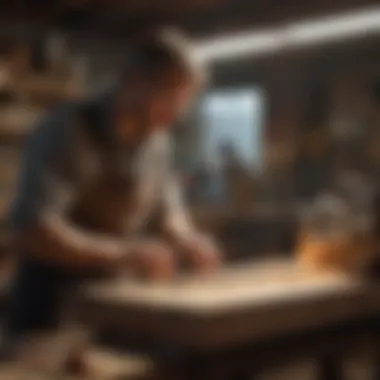Explore the Best Woodworking Shops in Cummins, MI


Intro
Woodworking is an essential craft that has thrived in communities across the United States, including Cummins, MI. This article aims to explore the rich landscape of woodworking shops in the area, shedding light on the local artisans who bring their unique skills to life. By examining the tools, materials, and resources available, readers can gain a better understanding of what makes the woodworking scene in Cummins both unique and accessible.
This guide will delve into critical topics such as key concepts and terminology related to woodworking, current trends and innovations shaping the industry, and practical applications that can be utilized by both novice and experienced woodworkers. Whether you are an agriculture farmer looking to enhance your livelihood or someone passionate about woodworking, this article serves as a comprehensive resource to help you navigate the local offerings.
Key Concepts and Terminology
Definition of Terms
Understanding the basic terminology in woodworking is essential for anyone looking to engage with this craft. Here are some pivotal terms that will be useful:
- Joinery: The method by which two pieces of wood are connected. Common types include dovetail joints and mortise-and-tenon joints.
- Lumber: This refers to wood that has been processed into beams and planks.
- Finishing: The process of applying a protective and decorative coat to a wooden item.
These terms lay the groundwork for more complex discussions regarding techniques and tools.
Overview of Relevant Practices
Woodworking encompasses a variety of practices, each with its unique focus. In Cummins, you can find artisans specializing in:
- Furniture Making: Crafting tables, chairs, and cabinetry that reflect both functionality and artistry.
- Sculptural Woodworking: Creating artistic pieces that may serve a decorative purpose or a functional role.
- Restoration: Reviving old or damaged wooden items to restore their original glory.
Each of these practices provides an insight into the craftsmanship that propels the local industry forward.
Current Trends and Innovations
Latest Research and Developments
The woodworking community is continually evolving, driven by innovations and a commitment to environmental sustainability. New materials and techniques are emerging, allowing carpenters and artisans to push boundaries while maintaining quality. Local shops in Cummins remain informed on these changes, allowing them to offer modern solutions to traditional crafts.
Emerging Technologies and Tools
The technological landscape has influenced how woodworking is approached today. Key tools gaining traction include:
- CNC Machines: These allow for precise cutting and engraving, making it easier to produce complex designs.
- Laser Cutters: These tools enhance design capabilities, enabling intricate patterns and shapes that were once labor-intensive.
As these tools become more available, local artisans adapt by integrating them into their workflows, enriching the craftsmanship present in Cummins.
Practical Applications
Step-by-Step Guides
Understanding how to apply woodworking techniques can be beneficial for both novices and seasoned professionals. Below are some basic steps to start a woodworking project:
- Gather Your Materials: Ensure you have high-quality lumber and the necessary tools.
- Create a Design: Sketch your project to have a clear plan.
- Make the Cuts: Use the appropriate tools to achieve accurate cuts.
- Assemble the Pieces: Use joinery techniques to bring everything together.
- Finish Your Work: Apply stain or paint to protect and enhance the appearance.
Troubleshooting Common Issues
Even the most experienced woodworkers encounter problems. Common issues include:
- Warping: Ensure that the wood is stored properly to prevent distortion.
- Uneven Cuts: Use a quality saw and ensure your measurements are precise.
Addressing these problems early on can help maintain a high standard of quality in your projects.
"The best way to predict the future is to create it." – Peter Drucker
In summary, the woodworking shops in Cummins, MI, offer a gateway into a world of craftsmanship, innovation, and community. By understanding key concepts, trends, and practical applications, readers can appreciate the depth and richness present in local woodworking. As you engage with these resources, remember that mastery comes with time and practice.
Prolusion to Woodworking in Cummins,
Woodworking in Cummins, MI is not only a craft; it is a vital part of the local culture and economy. Understanding this art form is essential for anyone interested in creative projects, whether it’s building furniture or crafting unique home decor. This article delves into the various aspects of woodworking shops in this region, showcasing their significance and the richness they offer to artisans and hobbyists alike.
Woodworking can enhance life in several key ways. First, it promotes creativity and hands-on skills, which is beneficial for individuals of all ages. The act of creating something from raw materials can be incredibly satisfying. Moreover, local woodworking shops serve as community hubs where people can connect over shared interests, fostering a sense of belonging.
This introduction sets the stage for what will be discussed in upcoming sections. We will explore the history of woodworking in the region, the various local shops, the tools and materials needed, and the community dynamics that make Cummins a notable location for woodworking enthusiasts.
It is also worth mentioning that the woodworking industry is increasingly embracing sustainability. Local shops often prioritize eco-friendly practices, which aligns with modern values regarding environmental responsibility. Understanding these dimensions will give insights into the overall craftsmanship and innovations related to woodworking in this area.
Overview of Woodworking
Woodworking is a discipline that encompasses the design, creation, and finishing of wooden items. The flexibility of wood allows artisans to create functional and aesthetic pieces. The woodworking process typically involves several stages: selecting quality wood, designing a project, cutting and shaping wood, and finally, finishing the product. Each of these stages requires different skills and tools.
Owning a woodworking shop in Cummins means engaging actively in this process, along with sharing knowledge and providing resources to aspiring woodworkers. The shops often cater to both seasoned craftsmen and newcomers, offering tools, materials, and guidance tailored to varying skill levels. As a result, these establishments become essential for promoting and preserving woodworking as a valued skill.
History of Woodworking in the Region
Understanding the history of woodworking in Cummins, MI, provides insights into the craftsmanship and techniques that have evolved over generations. This history shapes the identity of local artisans and influences the culture surrounding woodworking. It is crucial to appreciate how past practices and innovations set the foundation for current trends and techniques. By delving into this rich tapestry, one can gain a deeper appreciation for the dedication and skill that characterize this craft in the region.
Early Beginnings
The roots of woodworking in Cummins can be traced back to the early settlers who relied on timber for survival. They harvested local trees to build shelters and create essential tools. The rich forests surrounding the area provided ample resources, and the settlers’ connection to the land favored a culture of craftsmanship. As they honed their skills, the woodworking craft began to evolve.
During these formative years, woodworking was more than a trade; it was a necessity. The community learned to use simple hand tools. They employed techniques passed down through generations, allowing them to adapt and innovate. Much of the early woodworking was functional, focusing not on aesthetics but on practicality.
Evolution Over the Decades


As time progressed, the woodworking landscape in Cummins underwent significant transformations. The introduction of machinery in the late 19th and early 20th centuries marked a turning point. Tools like lathes and band saws made it easier to produce intricate designs. This change attracted a wider range of artisans who sought to express their creativity through woodworking.
The mid-20th century saw the rise of furniture-making businesses that catered not only to local clients but also to the growing market outside Cummins. These businesses emphasized quality and craftsmanship, establishing a reputation that remains important today. Interest in woodworking surged as more people began to view it as both an art and a hobby.
Today, local workshops embrace modern techniques while honoring traditional practices. Artisans in Cummins often combine old-world techniques with contemporary designs, making their creations unique. This blend of past and present reinforces the community's identity and continues to attract enthusiasts and professionals alike.
"The history of woodworking in Cummins, MI, is a reflection of the community’s resilience and creativity. Every piece tells a story of innovation and tradition."
As woodworking continues to evolve, understanding its history is vital. It highlights the craftsmanship and dedication of past generations and sets the stage for future developments in the field.
Local Woodworking Shops
Local woodworking shops serve as a vital hub for creativity and craftsmanship in Cummins, MI. These establishments not only provide a space for artisans and hobbyists to work but also foster a vibrant community where skills and ideas are shared. The value of these shops goes beyond just tools and materials; they are integral to the culture of woodworking in the area. By supporting local businesses, residents contribute to sustaining traditional crafts while also ensuring the growth of modern techniques and innovations.
Popular Establishments
Several woodworking shops stand out in Cummins for their unique offerings and community involvement. These shops cater to a diverse range of interests and skill levels among woodworkers:
- Cummins Woodworks: Known for its extensive range of hardwoods and custom furniture services, Cummins Woodworks attracts both amateur and seasoned woodworkers. The staff provides expert guidance on projects, ensuring customers leave with not only products but also knowledge.
- Heritage Carpentry: This establishment specializes in fine woodworking and restoration. It offers classes and workshops that appeal to those wanting to refine their skills. Heritage Carpentry emphasizes the importance of craftsmanship and attention to detail.
- The Wood Shed: A popular spot for hobbyists, The Wood Shed stocks a wide array of both hand tools and power equipment. It often hosts community events that enable woodworkers to collaborate and exchange techniques.
These shops play a significant role in maintaining the woodworking tradition. They empower individuals with the resources needed to explore their creativity.
Unique Offerings
In addition to core services, many woodworking shops in Cummins provide distinctive features that set them apart:
- Custom Orders: Many local shops, such as Cummins Woodworks, offer tailored solutions for clients looking for specific designs or products that cannot be found elsewhere.
- Sustainable Practices: Some establishments engage in sustainable sourcing of wood, ensuring that materials are both eco-friendly and responsibly harvested. This aspect is increasingly popular among those who prioritize environmental impact.
- Community Workshops: Numerous shops organize workshops that feature skilled artisans from the area. These events allow participants to learn new techniques and forge connections with other woodworking enthusiasts.
The combination of custom services, eco-friendly materials, and community engagement enhances the experience for anyone involved in woodworking in Cummins. Each of these unique offerings contributes to a deeper appreciation and understanding of the craft.
Tools and Equipment Available
Tools and equipment play a crucial role in woodworking. They define efficiency, craftsmanship, and safety in the workshop. Understanding what is available in Cummins, MI can greatly benefit both seasoned woodworkers and novices. This section examines the essential tools necessary for woodworking and advanced machinery that pushes the craft further.
Essential Tools for Woodworking
Woodworking demands a variety of hand tools and power tools. Basic hand tools are foundational for any woodworker. Essential items include chisels, saws, hand planes, and tape measures. Each item serves a unique purpose, allowing woodworkers to shape and join wood pieces with precision.
- Chisels are used for detailed work, shaping joints, and carving designs into wood.
- Saws, such as table saws or hand saws, give the ability to make long, straight cuts or intricate shapes.
- Hand planes help in smoothing surfaces and reducing thickness.
- Tape measures ensure accuracy in dimensions.
These tools allow woodworkers to manipulate wood directly. Investing in high-quality hand tools often leads to better results and longevity.
In addition to hand tools, power tools have become integral to modern woodworking. They save time and offer more uniform results. Common examples include:
- Drills for creating holes and driving screws.
- Sanders for smooth finishes on surfaces.
- Jigsaws for cutting curves and complex patterns.
When selecting essential tools, consider the specific woodworking projects. This ensures the tools purchased will be utilized effectively, optimizing expenses and storage space.
Advanced Machinery
The integration of advanced machinery into woodworking elevates the craft. This equipment enhances productivity and precision, allowing craftsmen to tackle larger projects or complex designs that would be challenging with hand tools alone.
Advanced machinery can include:
- CNC routers: These computer-controlled machines offer unparalleled precision for intricate designs and custom shapes. They are widely used for cutting, carving, and engraving.
- Planers and jointers: These machines create flat surfaces and uniform thickness on lumber. This is vital for ensuring joints fit together seamlessly.
- Laser cutters: They provide clean cuts with high accuracy, ideal for detailed work.
The benefits of using advanced machinery are significant. Time savings during production result in the ability to take on more projects or focus on finer details in craftsmanship. However, the upfront cost and learning curve can be considerations for new woodworkers.
"Investing in quality tools can save money in the long run by reducing material waste and increasing efficiency."
Types of Wood Available
Understanding the types of wood available is crucial for anyone involved in woodworking. It directly impacts the quality, appearance, and durability of the completed projects. Various wood types offer different characteristics, making them suitable for specific uses. In Cummins, MI, woodworkers have access to a range of local and exotic species, which can greatly enhance their crafting options.
Local Sourcing
Local sourcing of wood has several advantages. It supports the local economy and often provides wood that is well-suited to the climate and environmental conditions of the area. Wood from Cummins can be more sustainable and use less energy in transport compared to imported options. Here are some native species commonly used:
- Maple: Known for its strength and fine texture. Ideal for furniture and cabinetry.
- Cherry: Prized for its rich color and fine grain. Often used in high-quality furniture.
- Oak: Commonly used for flooring and furniture. It is sturdy and resistant to wear.
- Hickory: Recognized for its toughness and shock resistance, often used in tool handles and sports equipment.
Utilizing local wood reduces transportation emissions and promotes sustainable practices. Moreover, it allows woodworkers to develop a connection with their material, knowing the forest it came from and its growth journey.
Sustainable Practices
Sustainability in woodworking advocates for the responsible use of resources. The goal is to minimize waste and environmental impact while maximizing the utility of the wood. There are several sustainable practices employed in the Cummins woodworking community:
- Recycling Wood: Using reclaimed or salvaged wood reduces the need for new timber, allowing for unique character and history to be incorporated into projects.
- Responsible Sourcing: Sourcing wood from sustainably managed forests ensures the longevity of forest resources.
- Efficient Use of Material: Woodworkers are encouraged to plan their cuts and designs carefully to minimize offcuts and waste.
By integrating these practices into their work, local artisans ensure that their craft does not harm the environment. They contribute positively to the ecosystem while delivering quality products to clients.
"Sustainability is not just a trend; it is an essential practice that ensures the longevity of our resources and the quality of our craft."
By focusing on local sourcing and sustainability, the woodworking community in Cummins, MI, demonstrates a commitment not only to their craft but also to the environment.
Woodworking Community and Culture
The culture surrounding woodworking in Cummins, MI, is more than just a collection of wood shops and tools. It represents a community bound by shared passion, craftsmanship, and a commitment to artistry. The woodworking community encourages collaboration, where skills are exchanged, and inspiration is drawn from one another. It also extends beyond mere craftsmanship, promoting values of sustainability and creativity within the locality.


Networking Opportunities
Networking opportunities are abundant within this community. Local woodworkers often gather to share ideas, techniques, and experiences. This interaction is vital for both novice and seasoned artisans. Workshops and meetups facilitate these connections, enhancing the exchange of knowledge. For instance, many woodworking shops host events where artisans present their work and discuss their methods. This not only inspires others but also strengthens community ties.
Moreover, social media plays a significant role in connecting woodworkers. Platforms like Facebook and Reddit offer forums for sharing projects, asking questions, and receiving feedback. These online groups are crucial for keeping up with trends and innovations in woodworking.
"In woodworking, one's success often hinges on who you know as much as what you know."
Local Craft Fairs and Events
Local craft fairs and events are a cornerstone of the woodworking culture in Cummins. These gatherings provide artisans with a platform to showcase their work and interact directly with potential customers. Events like the Annual Cummins Craft Fair not only feature woodworking but also highlight other crafts, fostering a spirit of collaboration among different artisans.
These fairs offer multiple advantages:
- Promote Local Artisans: They give a space for local woodworkers to gain visibility.
- Education Opportunities: Aspiring woodworkers can learn from established artisans through demonstrations and discussions.
- Community Engagement: These gatherings bring together families, fostering a sense of unity and pride in local craftsmanship.
As such, participating in these events can be both fulfilling and beneficial for artisans looking to expand their reach and credibility.
Educational Resources for Woodworkers
Access to quality educational resources is vital for both novice and seasoned woodworkers. This section discusses the range of workshops, classes, and online learning opportunities available to enhance the skills of individuals in Cummins, MI. These resources not only impart practical knowledge but also foster community engagement and promote a culture of craftsmanship.
Workshops and Classes
Workshops and classes provided by local woodworking shops serve as critical avenues for hands-on learning. These sessions often include practical demonstrations, enabling participants to gain direct experience with tools and techniques. Instructors usually have extensive backgrounds in woodworking, offering valuable insights into the craft.
Enrolling in these workshops holds multiple benefits:
- Skill Development: Participants can master fundamental techniques, from basic joinery to intricate carving.
- Equipment Familiarization: Attendees get the opportunity to work with specialized tools, ensuring that they understand the proper usage and maintenance of each.
- Networking: Engaging in these classes allows individuals to connect with like-minded enthusiasts, forming a network that can be beneficial for future collaborations.
Local shops frequently update their course offerings based on demand and seasonal trends. This adaptability ensures that woodworkers get relevant training in the techniques that are trending in the market. For example, some workshops may focus on rustic furniture making, while others could emphasize modern design techniques.
Online Learning Opportunities
In addition to traditional workshops, various online platforms offer expansive resources for woodworkers. Websites and online courses provide flexibility, allowing individuals to learn at their own pace. This avenue is particularly advantageous for those who may not have easy access to physical classes or prefer to study in a self-directed manner.
Key aspects of online learning for woodworkers include:
- Access to Expert Tutorials: Websites often feature videos and classes led by professionals in the woodworking community. These resources expose learners to various styles and techniques that might not be available in local workshops.
- Wide Range of Topics: Online education covers an extensive array of topics. From woodworking basics to advanced techniques like CNC machining, learners can choose courses that suit their skill level and interests.
- Community Support: Online platforms often have forums or discussion boards where learners can ask questions and share their progress. This interaction contributes to a sense of community, similar to in-person workshops.
While online learning can be highly beneficial, it is essential to evaluate the credibility of the sources. Ensuring that content is created by experienced woodworkers is crucial for obtaining accurate and high-quality instruction.
"The internet has democratized access to knowledge, making it easier for enthusiasts to improve their craft from anywhere."
Innovation in Woodworking Techniques
Innovation plays a crucial role in woodworking by introducing new methods, tools, and materials that can significantly enhance craftsmanship. The woodworking industry is evolving, and this evolution is driven by the need for efficiency, precision, and sustainability. As artisans and hobbyists in Cummins, MI, grapple with both traditional practices and modern advancements, it becomes vital to explore how these innovations impact the local woodworking community.
Emerging Trends
Modern woodworking is witnessing several trends that shape the way artisans approach their craft. One such trend is the increasing use of streamlined designs. Minimalism has gained popularity and many woodworkers adapt their techniques to create simpler lines and forms. This reflects a shift toward practicality, where functionality meets aesthetics.
Additionally, the incorporation of digital design tools and software has transformed how woodworkers visualize projects. Programs like SketchUp or AutoCAD allow users to design, modify, and plan their projects with precision. This digital shift not only simplifies the design process but also allows for more intricate outcomes that would be difficult to achieve with hand-drawn plans.
Another trend is the emphasis on handmade products. Customization is more appealing to consumers who prefer unique and personal items over mass-produced goods. Local artisans in Cummins embrace this by creating bespoke furniture and decor pieces. This trend strengthens the connection between the craftsman and the customer, fostering a sense of community.
Technological Advancements
Technology in woodworking has advanced markedly in recent years, leading to more efficient methods and higher-quality outputs. One of the most notable advancements is the rise of CNC (Computer Numerical Control) machines. These devices automate the cutting and shaping of wood, allowing for precise dimensions and intricate designs that were once tedious manual tasks. CNC machines expand opportunities for artists in Cummins to push the boundaries of their craft.
Furthermore, innovations in material technology have produced alternatives such as engineered wood products, which offer strength and stability. Lumber with enhanced properties provides more options to woodworkers, allowing them to meet specific customer needs or adapt to environmental challenges.
In addition, sustainability-focused technology has grown. Tools that reduce waste and optimize material usage are now more common. Many woodworkers adopt practices that align with eco-friendly principles, acknowledging their impact on the environment and community. For example, using reclaimed wood not only benefits the ecosystem but also adds character to each project.
Overall, these innovations contribute significantly to the woodworking landscape in Cummins, MI. By embracing technology and adapting to emerging trends, local artisans can enhance their skills, improve their craft, and build a sustainable future for woodworking in the region.
Health and Safety in Woodworking
Woodworking is a fulfilling and creative endeavor, yet it carries certain risks. It is crucial to understand health and safety in woodworking to ensure a secure working environment. In Cummins, MI, many woodworking shops prioritize safety protocols, but personal awareness plays a vital role. This section addresses common risks, preventive measures, and the importance of using proper safety equipment.
Common Risks and Preventive Measures
When engaging in woodworking, various hazards can arise. Some common risks include:
- Cuts and Lacerations: Tools like saws and chisels can cause severe injuries.
- Dust Inhalation: Fine particles can lead to respiratory issues when inhaled over time.
- Noise-Induced Hearing Loss: Prolonged exposure to loud machinery can harm hearing.
- Material Handling Injuries: Lifting heavy wood pieces can cause strain or injury.
Preventive measures are essential for mitigating these risks. Simple strategies can create a safer workspace:
- Maintain Tools: Regularly check and service tools to ensure they are in good working condition.
- Use Proper Techniques: Familiarize oneself with safe operating procedures for all equipment.
- Ventilation: Ensure adequate airflow in the workspace to reduce dust accumulation.
- Clean Up Regularly: Maintain a tidy work area to avoid tripping hazards.
The implementation of these practices significantly enhances safety and minimizes the risk of accidents.
Proper Use of Personal Protective Equipment
Utilizing Personal Protective Equipment (PPE) is non-negotiable in woodworking. PPE serves as a barrier between the worker and potential hazards. Essential types of PPE include:


- Safety Glasses: Protect the eyes from flying debris and dust.
- Hearing Protection: Earplugs or earmuffs help shield hearing from loud machinery.
- Dust Masks: These prevent inhalation of dust particles.
- Cut-Resistant Gloves: Wearing gloves is crucial when handling sharp tools. However, one must ensure they do not hinder dexterity.
Before beginning any woodworking task, it’s vital to don the appropriate PPE.
Failure to prioritize safety measures can result in significant injury or long-term health issues. Being proactive about health and safety promotes a sustainable and enjoyable woodworking practice.
In summary, understanding and implementing health and safety measures in woodworking are essential. Not only does this knowledge foster a safer environment, but it also enhances the overall woodworking experience.
Sustainability in Woodworking
Sustainability in woodworking is a critical aspect that encompasses various methods and practices aimed at conserving resources and protecting the environment. In an era where ecological responsibility is paramount, woodworking shops in Cummins, MI, are increasingly adopting sustainable practices. This commitment not only contributes to the health of local ecosystems but also enhances the quality and longevity of their craftsmanship.
The importance of sustainability lies in its multifaceted benefits. Firstly, it promotes the use of renewable resources and reduces waste, which aligns well with the growing demand for eco-conscious products. Secondly, sustainable practices can often lead to cost savings in the long run, as they enhance efficiency and reduce reliance on non-renewable materials. By employing sustainable methods, woodworking shops create a positive impact on the community, fostering a culture of responsibility and awareness.
As more consumers become environmentally aware, shops that prioritize sustainability can gain a competitive edge. This section will explore specific eco-friendly practices and the role of reclaimed wood in enhancing sustainability in woodworking.
Eco-Friendly Practices
Eco-friendly practices in woodworking involve the conscious choice of materials, techniques, and processes that minimize the negative impact on the environment. Shops in Cummins adopt several strategies to ensure that their operations are sustainable.
- Sourcing of Materials: Many local woodworkers focus on sourcing wood from certified sustainable forests. This helps maintain ecological balance while providing high-quality materials.
- Low-VOC Finishes: Using low-emission volatile organic compounds in finishes and paints minimizes harmful emissions that can affect air quality.
- Energy Efficiency: Implementing energy-efficient machinery and considerate use of power not only lowers emissions but also reduces operational costs.
- Waste Management: Efficient waste management strategies are also essential. Shops often repurpose scrap wood into smaller projects or donate excess materials to local artisans.
These practices not only support the environment but also enhance the overall product quality and appeal to an environmentally conscious customer base.
The Role of Reclaimed Wood
Reclaimed wood plays a significant role in promoting sustainability within the woodworking community. Utilizing wood that has been salvaged from old buildings, furniture, or other structures reduces the demand for new lumber. This practice has several tangible benefits:
- Environmental Impact: By repurposing wood, woodworkers help conserve forests and decrease deforestation.
- Unique Aesthetics: Reclaimed wood often has a distinct character, with unique grains and textures that enhance the aesthetic appeal of any project.
- Durability: Many reclaimed pieces, particularly those from older structures, often prove to be more durable than newly sourced wood due to their age and natural aging processes.
Using reclaimed wood is not just an environmental choice; it showcases creativity and craftsmanship, appealing to a market looking for distinctive, eco-friendly products. Shops in Cummins that utilize such techniques are often seen as leaders in the movement towards eco-responsible woodworking.
"Sustainability is not just a trend but a necessity for preserving our natural resources and ensuring future generations can enjoy woodworking as we know it today."
This dedication to sustainability in woodworking is vital for both local artisans and the wider community, paving the way for future growth and innovation. As Cummins continues to develop its woodworking industry, these sustainable practices will become increasingly important.
Challenges Faced by Woodworkers
Woodworkers in Cummins, MI, face numerous challenges that can impact their craft, growth, and sustainability. Understanding these challenges is essential for both seasoned artisans and newcomers alike. The woodworking industry requires ongoing adaptation to changing market dynamics, resource availability, and competitive pressures. Recognizing these hurdles allows woodworkers to strategize and build a more resilient craft.
Market Competition
The woodworking market in Cummins is increasingly competitive. Many local artisans and small businesses vie for attention from a limited customer base. This saturation can drive down prices, making it difficult for established woodworkers to maintain their profit margins. Additionally, large manufacturers often flood the market with mass-produced items, creating a challenging environment for those emphasizing quality craftsmanship.
To navigate this competition, woodworkers must distinguish themselves through unique designs, exceptional craftsmanship, or specialized services. Building a solid brand identity becomes crucial. Some may choose to focus on custom pieces that cater to local tastes or preferences. Collaboration with local designers or participation in community events can also enhance visibility and provide opportunities to connect with potential clients.
Access to Resources
Accessing resources is another significant challenge for woodworkers in the region. Quality materials can be scarce, especially those sourced sustainably. Small workshops often struggle to find the right types of wood, tools, or machinery necessary for high-level performance. This can lead to delays in projects or compromises in quality, affecting customer satisfaction and repeat business.
Many woodworkers rely on local suppliers, but these channels may not always have the variances in stock needed for specific projects. This scarcity of materials can create a reliance on online suppliers, which may add shipping costs and time to the mix. Furthermore, the skills and knowledge necessary to use advanced machinery aren’t always readily available to all local artisans.
"Understanding available resources is key. Engaging with other woodworkers or joining local woodworking groups can help foster connections, leading to better access to materials and tools."
Building relationships with suppliers or investing in sustainable sourcing practices can help alleviate these access issues. Participating in community dialogues about resource sharing or supporting local initiatives can also strengthen the woodworking community, thereby increasing efficiency and sustainability for all involved.
Future of Woodworking in Cummins,
The future of woodworking in Cummins, MI holds significant relevance for both the local community and the broader woodworking industry. With growing interest in sustainable practices and handcrafted goods, the woodworking sector is positioned for notable transformation. Artisans and businesses in this area face both challenges and opportunities. Staying informed about market trends, consumer demands, and technological advancements remains crucial for local woodworkers.
Further, local involvement can shape the future direction of woodworking shops. The community's support will guide which tools, techniques, and materials gain traction. Increased collaboration among artisans can foster innovation and a sense of shared purpose in preserving craftsmanship. The future encompasses a synergy of tradition and modern methodologies that will define woodworkers’ landscape.
Predictions and Outlook
The outlook for woodworking in Cummins suggests a positive evolution. As more individuals gravitate towards DIY projects and bespoke creations, demand for locally-sourced woodwork is likely to rise. This trend aligns with a broader societal shift towards sustainability. By incorporating eco-friendly practices, shops can not only attract environmentally-conscious consumers but also position themselves as leaders in this niche.
Additionally, advancements in woodworking technology are set to enhance productivity. Shops that adopt new machinery and online platforms for showcasing their work stand to benefit significantly. The integration of digital marketing strategies also presents a pathway for local artisans to reach wider audiences.
Potential for Growth
There is considerable potential for growth within the woodworking sector in Cummins. Increased awareness of the importance of handcrafted goods supports a niche market that could thrive. Workshops and classes that educate the community about woodworking may also contribute to this growth. Encouraging new artisans to pursue woodworking can lead to a revitalized craft economy.
- Focus on Sustainability: Shops adopting sustainable sourcing can distinguish themselves in a competitive market.
- Community Engagement: Strengthening community ties through events and collaborations can enhance visibility and sales.
- Diversified Offerings: Expanding product lines to include new designs can cater to varied customer preferences.
Overall, the future of woodworking in Cummins, MI looks promising, driven by community engagement, sustainability, and innovative practices.
Epilogue
The conclusion serves as a crucial part of any comprehensive exploration, summarizing the core themes and insights presented throughout the article. In this context, the conclusion of the article on woodworking shops in Cummins, MI encapsulates the wealth of knowledge regarding local artisans, their craftsmanship, and the community's engagement with the woodworking culture.
This article highlights the relevance of craftsmanship in maintaining traditional skills while embracing innovation. Woodworking in Cummins is not just a trade; it reflects a rich heritage and a dedication to quality. The discussion about various resources available for woodworkers of all skill levels emphasizes the area’s commitment to fostering talent and sustaining an inclusive woodworking community.
Moreover, it is essential to recognize the various tools and materials that play a significant role in the woodworking process. Understanding the tools, from essential hand tools to advanced machinery, is vital for both hobbyists and professional woodworkers. This knowledge can directly influence the quality of work produced and, consequently, the satisfaction derived from it.
Additionally, the conclusion underlines the importance of sustainability practices being adopted within local woodworking shops. With an eye towards the future, the woodworking community in Cummins demonstrates an awareness of ecological ramifications tied to sourcing and materials.
In summary, this article not only showcases the woodworking landscape in Cummins but also reflects broader trends about craftsmanship, community support, and sustainability. As woodworking continues to evolve, so does the community, ready to adapt and grow. Each aspect presented underscores the importance of not just what is created, but how these creations impact the artisans and the environment.
Summary of Key Insights
- Diverse Craftsmanship: Woodworking shops in Cummins offer a variety of techniques and styles, showcasing the skills of local artisans.
- Education and Growth: Resources for learning, including workshops and online courses, are vital for both beginners and seasoned woodworkers.
- Sustainability Efforts: There is a notable focus on eco-friendly practices, ensuring woodworkers contribute positively to environmental stewardship.
- Community Engagement: Events and networking opportunities enhance camaraderie among woodworkers, fostering an environment for sharing knowledge and experiences.
- Originality in Design: Unique offerings at local shops reflect individuality and creativity, making the region a hub for distinctive woodworking projects.
By understanding the interconnectedness of the community, tools, and craft, enthusiasts can appreciate the depth of woodworking in Cummins, MI.







